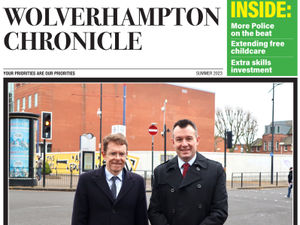Tories apologise and donate to charity after Chronicle newspaper trademark infringement
The Conservative Party has apologised for a trademark infringement after sending out political adverts to voters in the region masquerading as a local newspaper.

Political campaign material was sent to homes in the style of newspapers, with the titles Wolverhampton Chronicle, Sandwell Chronicle and Dudley Chronicle.
Those names are trademarked by Midland News Association, publisher of the Express & Star, and are distributed as free local newspapers across the region under the title Chronicle Week.
The Conservative versions were designed to mimic the style of a newspaper and they caused confusion among many who received them, who believed they were reading their usual Chronicle.
Now the Conservative Party has unreservedly apologised to the Midland News Association and agreed to provide a donation to charity.
It has also published an advertisement in today’s Express & Star in which it provides an explanation. It reads: “Earlier this month we published three pieces of campaign literature titled the Wolverhampton Chronicle, the Sandwell Chronicle, and the Dudley Chronicle. It has been brought to our attention the titles of all three of these party-political leaflets were titled the same as three newspapers published and owned by MNA Media. This was a genuine mistake, and it was never our intention to mislead residents. We understand the confusion this may have caused, and we sympathise with the reputational damage this could cause an independent media outlet with nearly 150 years’ service to your local community.
“MNA Media has never been and continues not to be associated with the Conservative Party. We therefore would like to apologise to the MNA Media Group.”
Midlands News Association managing director Matt Ross said that, by mimicking long-standing titles owned by the MNA, the Conservative Party was seeking disingenuously to benefit from the credibility of trusted local news brands which have been a part of the fabric of communities across the West Midlands for generations.
He said: “All of these titles are trademarked by us. It is vitally important that we protect both their integrity and the rights of our readers who look to our titles for reliable and objective news and information. Consequently, we have come to an agreement with the Conservative Party, which has made a payment that will be donated to local charities.
“As a trusted media organisation, soon to be celebrating our 150th year of publishing, we have previously suffered similar infringements from organisations prepared to mislead readers by attempting deceitfully to strengthen the provenance of material they publish. It is hard to comprehend how the political party responsible for governing our country could have made such a grave error.
“Although the matter has been resolved amicably and to the benefit of local charities, I am utterly bemused why an institution like the Conservative Party should seek to camouflage its identity in such a way. There was no reference to the party whatsoever on the majority of the materials. In my experience individuals who are proud to be associated with the brand they represent would never seek to disguise their identity.”
The tactic of making political campaign material look like a newspaper has been heavily criticised by the Electoral Commission in the past. It has called on political parties “to take greater responsibility for the presentation and content of campaigns” but has no legal powers to control content.
An Electoral Commission spokesman said: “Voters have expressed concerns to us about the presentation, labelling or layout of campaign material. We encourage all campaigners to undertake their vital role responsibly and to support campaign transparency.
"However, we don’t have the power to regulate campaign material.
"There is nothing in law to control the style and presentation of campaign material. The Commission’s remit when it comes to campaign material relates to whether printed material has an imprint and we regulate party and campaigner compliance with the law.
"Existing imprint laws require campaigners to be clear about who is responsible for producing and promoting campaign material, although these do not require the inclusion of a specific label or text identifying it as election and referendum campaign material.”





